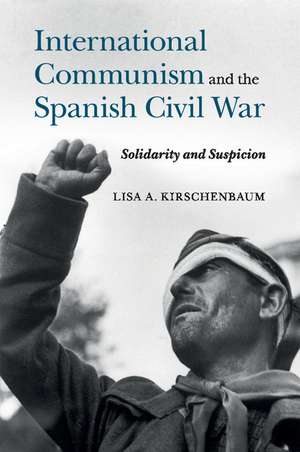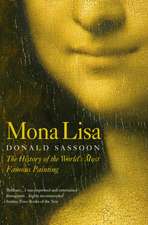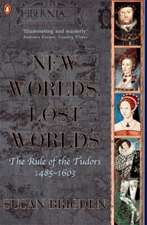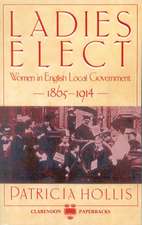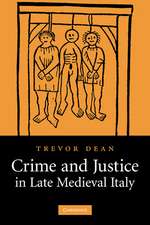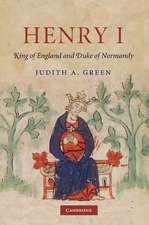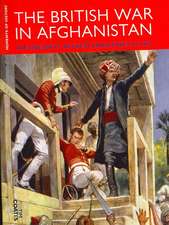International Communism and the Spanish Civil War: Solidarity and Suspicion
Autor Lisa A. Kirschenbaumen Limba Engleză Paperback – 24 ian 2018
| Toate formatele și edițiile | Preț | Express |
|---|---|---|
| Paperback (1) | 282.28 lei 6-8 săpt. | |
| Cambridge University Press – 24 ian 2018 | 282.28 lei 6-8 săpt. | |
| Hardback (1) | 683.36 lei 6-8 săpt. | |
| Cambridge University Press – 27 iul 2015 | 683.36 lei 6-8 săpt. |
Preț: 282.28 lei
Nou
Puncte Express: 423
Preț estimativ în valută:
54.05€ • 56.28$ • 44.84£
54.05€ • 56.28$ • 44.84£
Carte tipărită la comandă
Livrare economică 13-27 februarie
Preluare comenzi: 021 569.72.76
Specificații
ISBN-13: 9781107514058
ISBN-10: 1107514053
Pagini: 292
Ilustrații: 10 b/w illus.
Dimensiuni: 152 x 230 x 20 mm
Greutate: 0.44 kg
Editura: Cambridge University Press
Colecția Cambridge University Press
Locul publicării:New York, United States
ISBN-10: 1107514053
Pagini: 292
Ilustrații: 10 b/w illus.
Dimensiuni: 152 x 230 x 20 mm
Greutate: 0.44 kg
Editura: Cambridge University Press
Colecția Cambridge University Press
Locul publicării:New York, United States
Cuprins
Introduction: being communist; Part I. International Communists and the Soviet Union, 1930–6: 1. Learning to be Bolshevik; 2. Imagining, seeing, feeling the revolution; Part II. Being Bolshevik, Making History in Spain, 1936–9: 3. 'All advanced and progressive humanity'; 4. True Bolsheviks and Trotskyite bastards; 5. Best comrades, tough guys, and respectable communists; Part III. International Communists and the Memory of the Spanish Civil War, 1939–53: 6. From 'our war' to the great fatherland war; 7. The early Cold War and the fate of 'progressive humanity'; Epilogue: internationalism and the Spanish Civil War after Stalin.
Recenzii
'Lisa A. Kirschenbaum offers an important contribution to Spanish Civil War studies, linking the 1930s with the Cold War era. Well-written and well-researched, her book illuminates both personal and political issues that shaped participants through their lives.' Peter N. Carroll, Stanford University, California and author of From Guernica to Human Rights: Essays on the Spanish Civil War
'Kirschenbaum's International Communism and the Spanish Civil War offers a welcome, fresh approach to looking at the Spanish Civil War. Rather than taking one of the two standard and highly polarized positions on the role of the communists, she adopts a more neutral stance and seeks to convey what the experience was like for the committed internationalist, basing much of her text on diaries, letters, and archival materials produced by the actual participants. She also puts the war into a broader perspective within the international communist movement, looking at key institutions, networks, and attitudes from before the war and also covering the decades since the Republican cause was lost in 1939, so that the book is really a history of the international communist movement told from the perspective of the civil war in Spain. It is well documented and highly readable.' Katerina Clark, Yale University, Connecticut
'A dazzling, deeply informed, and spiritedly composed sociocultural history of international communism, taking as its principal case study the mobilization of communists around the Spanish Civil War, Kirshenbaum's new book puts a human face on interwar communism and explores the daily life, interpersonal relationships, triumphs, and tragedies of individual communists, committed to the cause. … Through impressively deep research in unexplored archives, Kirshenbaum argues that the Comintern was much more than a series of decisions dictated from Moscow; it was people, relationships, and adventures. It had a soundtrack, too, and that was the raised, optimistic, voices of tens of thousands, singing the same song in many languages, first in Moscow and then in Spain. … The topic and approach of this unique, beautifully written volume will recommend it to college courses covering the Spanish Civil War, international communism, interwar Europe, the European civil wars (1914–45), and twentieth-century Europe.' Danny Kowalsky, Queen's University Belfast
'… this book is an impressive piece of scholarship which reflects both the author's command of innovative investigative methods as well as her profound knowledge of the Stalinist era. As such, it is a book that should not be overlooked by anyone interested in Spain's war and its place in the history of international communism.' George Esenwein, The Russian Review
'Kirschenbaum opts for an intelligent balance between description and analysis in her work. She shows that the history of communist internationalism is more than just the history of the leading elites. It is the history of a vital base, intimate and individualized, in which personal letters, poems and other series of personal productions during the war became solid primary sources for the reconstruction of another of the trajectories of the communist movement.' Josep Puigsech Farras, European History Quarterly
'With its cultural and biographical approach, the book goes beyond the still polarized historiography of the Spanish Civil War, offering instead a fascinating, intimate picture of how it felt to be a communist in a context full of contradictions and conflicts. Political commitment was never just ideological, it was profoundly tied to personal experiences and self-identity.' Brigitte Studer, Slavic Review
'… a valuable contribution.' Laurie Cohen, Jahrbücher für Geschichte Osteuropas
'This study should certainly be read by historians of the Spanish Civil War; as well as by scholars of antifacism and Stalinism. More importantly, it should be considered by those studying the Comintern, especially with regard to transnationalism.' Oleksa Drachewych, Europe-Asia Studies
'Kirschenbaum's International Communism and the Spanish Civil War offers a welcome, fresh approach to looking at the Spanish Civil War. Rather than taking one of the two standard and highly polarized positions on the role of the communists, she adopts a more neutral stance and seeks to convey what the experience was like for the committed internationalist, basing much of her text on diaries, letters, and archival materials produced by the actual participants. She also puts the war into a broader perspective within the international communist movement, looking at key institutions, networks, and attitudes from before the war and also covering the decades since the Republican cause was lost in 1939, so that the book is really a history of the international communist movement told from the perspective of the civil war in Spain. It is well documented and highly readable.' Katerina Clark, Yale University, Connecticut
'A dazzling, deeply informed, and spiritedly composed sociocultural history of international communism, taking as its principal case study the mobilization of communists around the Spanish Civil War, Kirshenbaum's new book puts a human face on interwar communism and explores the daily life, interpersonal relationships, triumphs, and tragedies of individual communists, committed to the cause. … Through impressively deep research in unexplored archives, Kirshenbaum argues that the Comintern was much more than a series of decisions dictated from Moscow; it was people, relationships, and adventures. It had a soundtrack, too, and that was the raised, optimistic, voices of tens of thousands, singing the same song in many languages, first in Moscow and then in Spain. … The topic and approach of this unique, beautifully written volume will recommend it to college courses covering the Spanish Civil War, international communism, interwar Europe, the European civil wars (1914–45), and twentieth-century Europe.' Danny Kowalsky, Queen's University Belfast
'… this book is an impressive piece of scholarship which reflects both the author's command of innovative investigative methods as well as her profound knowledge of the Stalinist era. As such, it is a book that should not be overlooked by anyone interested in Spain's war and its place in the history of international communism.' George Esenwein, The Russian Review
'Kirschenbaum opts for an intelligent balance between description and analysis in her work. She shows that the history of communist internationalism is more than just the history of the leading elites. It is the history of a vital base, intimate and individualized, in which personal letters, poems and other series of personal productions during the war became solid primary sources for the reconstruction of another of the trajectories of the communist movement.' Josep Puigsech Farras, European History Quarterly
'With its cultural and biographical approach, the book goes beyond the still polarized historiography of the Spanish Civil War, offering instead a fascinating, intimate picture of how it felt to be a communist in a context full of contradictions and conflicts. Political commitment was never just ideological, it was profoundly tied to personal experiences and self-identity.' Brigitte Studer, Slavic Review
'… a valuable contribution.' Laurie Cohen, Jahrbücher für Geschichte Osteuropas
'This study should certainly be read by historians of the Spanish Civil War; as well as by scholars of antifacism and Stalinism. More importantly, it should be considered by those studying the Comintern, especially with regard to transnationalism.' Oleksa Drachewych, Europe-Asia Studies
Notă biografică
Descriere
This book provides an intimate picture of international communism during the Spanish Civil War.
